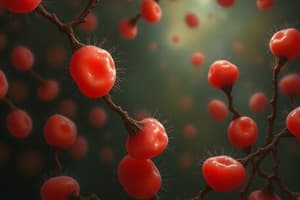Podcast
Questions and Answers
What is a lymphocyte?
What is a lymphocyte?
- A type of red blood cell
- A type of white blood cell (correct)
- A type of nerve cell
- A type of muscle cell
What is a basophil?
What is a basophil?
A type of white blood cell that plays a role in allergic reactions.
What is an eosinophil?
What is an eosinophil?
A type of white blood cell that fights parasites and is involved in allergic responses.
What is a monocyte?
What is a monocyte?
What is a neutrophil?
What is a neutrophil?
What is a megakaryocyte?
What is a megakaryocyte?
What is a platelet?
What is a platelet?
What blood type is A+?
What blood type is A+?
What is blood type O+?
What is blood type O+?
What is blood type O-?
What is blood type O-?
What blood type is B-?
What blood type is B-?
What blood type is AB-?
What blood type is AB-?
Flashcards are hidden until you start studying
Study Notes
Lymphocyte
- A type of white blood cell integral to the immune response.
- Subtypes include T cells (cell-mediated immunity) and B cells (antibody production).
- Play a crucial role in recognizing and responding to pathogens.
Basophil
- Least common type of granulocyte, involved in inflammatory responses.
- Releases histamine and other chemicals to mediate allergic reactions and asthma.
- Contains granules that stain dark blue with basic dyes, hence the name.
Eosinophil
- Primarily associated with combating parasitic infections and allergic reactions.
- Contains granules that stain red with acidic dyes, indicating its role in inflammation.
- Plays a role in modulating responses to allergens and asthma.
Monocyte
- Largest type of leukocyte, with a kidney-shaped nucleus.
- Develops into macrophages and dendritic cells once it migrates into tissues.
- Essential for phagocytosis and presenting antigens to T cells in immune responses.
Neutrophil
- Most abundant type of white blood cell, important for bacterial infection response.
- Characterized by a multi-lobed nucleus and granular cytoplasm.
- Contains enzymes that digest bacteria and cellular debris.
Megakaryocyte
- A large bone marrow cell responsible for producing platelets (thrombocytes).
- Plays a vital role in blood clotting and wound healing processes.
- Releases thousands of platelets into the bloodstream.
Platelet
- Small, disc-shaped cell fragments crucial for normal blood clotting.
- Formed from the cytoplasm of megakaryocytes in the bone marrow.
- Active in hemostasis by aggregating at sites of blood vessel injury.
Blood Types
- A+: A blood type with A antigens and Rh factor present.
- O+: The most common blood type, lacking A and B antigens but with Rh factor.
- O-: Universal donor blood type; lacks A and B antigens and Rh factor.
- B-: A blood type with B antigens absent of Rh factor.
- AB-: A rare blood type that has both A and B antigens but lacks the Rh factor.
Studying That Suits You
Use AI to generate personalized quizzes and flashcards to suit your learning preferences.



